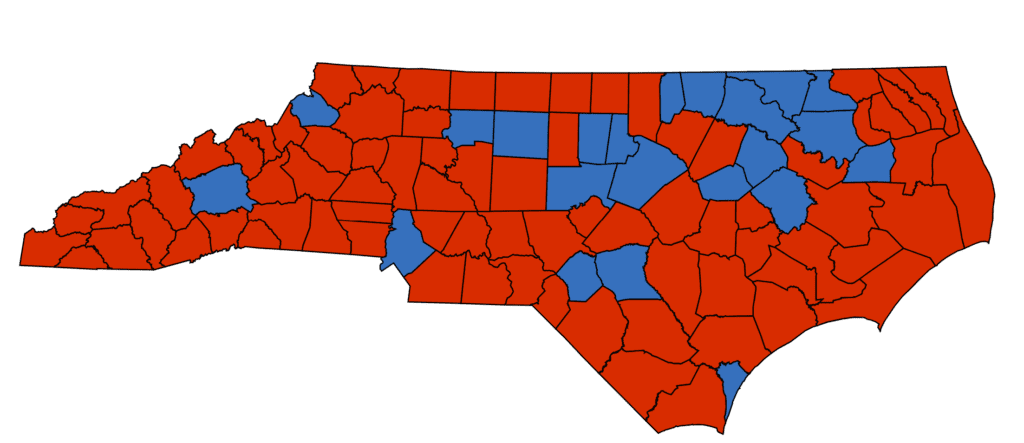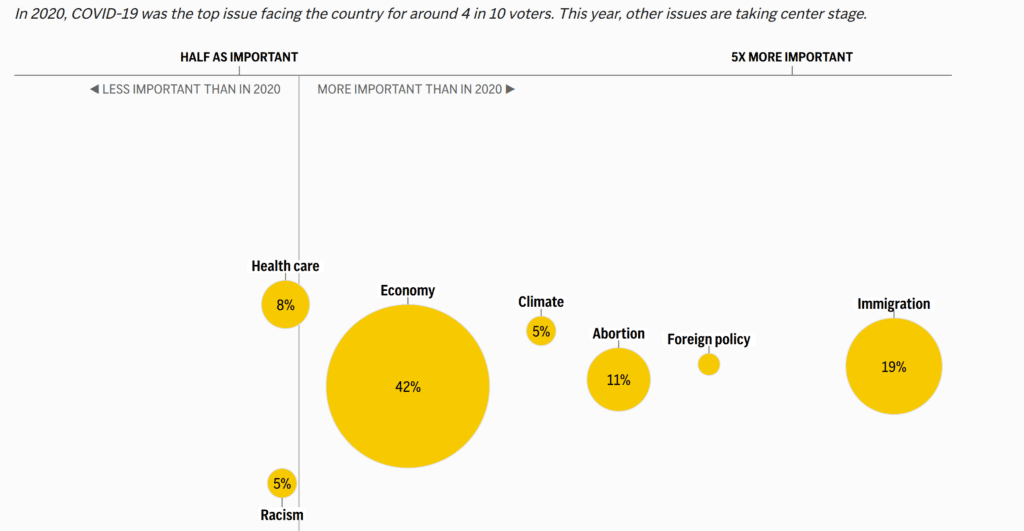
|
|
The Associated Press has called the election for Donald Trump, Josh Stein, and Mo Green
Editor’s Note: This article will be updated at 5 p.m. daily until all races are called and the results are official.
More than 5.6 million North Carolinians voted in the 2024 general election, according to unofficial data from the N.C. State Board of Elections data, or 73% of the state’s 7.8 million total eligible voters.
At the time of publication, according to the Associated Press (AP), the Republican candidate Donald Trump has won the race for president with 277 electoral votes. The AP called it “a remarkable political comeback rooted in appeal to frustrated voters.”
Trump won North Carolina with 50.95% of the vote, a 3.39% lead, according to unofficial results from the N.C. State Board of Elections. Democratic candidate Kamala Harris appears to have won just 22 of the counties in North Carolina.

In addition to this year’s presidential election, the ballot included many state races likely to have a big impact on education. This includes the race for the state superintendent of public instruction, who supports the state’s more than 2,500 public schools and leads North Carolina’s Department of Public Instruction (DPI).
The AP called the race at 1:25 a.m. for Democratic candidate Maurice “Mo” Green — the former superintendent of Guilford County Schools. According to unofficial data from the N.C. State Board of Elections, Green is up by 119,515 votes. Green sent out an email that said, “We met the moment, together as champions of public education.”
Superintendent Catherine Truitt pledged a smooth transition.
As EdNC previously reported, there were also 292 local school board seats up for election this November across 87 school districts. This year, 52 districts held partisan elections versus 41 in 2022. Prior to 2013, there were only 10 partisan school districts in North Carolina.
To find unofficial results for all of the state’s races, including local school board elections, go to the State Board of Elections website.
President and other federal races
According to the AP, these are the issues that mattered to North Carolina voters in the 2024 election.

But the president also leads federal education policy in the United States.
For starters, the president oversees the U.S. Department of Education (DOE) and appoints the secretary of education, who leads the department’s work. According to the DOE’s website, the department has 4,400 employees and a $68 billion budget.
Among other things, the DOE collects and disseminates data and research on schools, ensures equal access to education, and establishes policies on federal financial aid for education.
The DOE also helps disperse federal education funding to each state and then monitors how those funds are spent. Most recently, the department has monitored the disbursement and spending of billions of dollars in federal COVID-relief funds.
In 2025, the DOE estimates that $4.8 billion in federal dollars will benefit education in North Carolina.
U.S. Congress
Here is a breakdown of who won the U.S. House seats according to unofficial results. You can click on the winner’s name to view their campaign website.
- District 1: Democratic incumbent Don Davis (49.46%) defeated Republican Laurie Buckhouse.
- District 2: Democratic incumbent Deborah Ross (66.23%) defeated Republican Alan Swain.
- District 3: Republican incumbent Greg Murphy (77.5o%) defeated Libertarian Gheorghe Cormos.
- District 4: Democratic incumbent Valerie Foushee (71.83%) defeated Republican Eric Blankenburg.
- District 5: Republican incumbent Virginia Foxx (59.53%) defeated Democrat Chuck Hubbard.
- District 6: Republican Addison McDowell (69.24%) defeated Constitutionalist Kevin Hayes.
- District 7: Republican incumbent David Rouzer (58.72%) defeated Democratic Marlando Pridgen.
- District 8: Republican Mark Harris (59.68%) defeated Democrat Justin Dues.
- District 9: Republican incumbent Richard Hudson (56.41%) defeated Democratic Nigel Bristow.
- District 10: Republican Pat Harrigan (57.71%) defeated Democrat Ralph Scott.
- District 11: Republican incumbent Chuck Edwards (56.82%) defeated Democrat Caleb Rudow.
- District 12: Democratic incumbent Alma Adams (73.98%) defeated Republican Addul Ali.
- District 13: Republican Brad Knott (58.74%) defeated Democrat Frank Pierce.
- District 14: Republican Tim Moore (58.15%) defeated Democrat Pam Genant. Moore currently serves as the Republican House Speaker in the North Carolina General Assembly.
There were no U.S. Senate seats up for election in North Carolina this year.
Governor


Democratic candidate Josh Stein, the current attorney general of North Carolina, defeated Republican candidate Mark Robinson early in the night.
Stein received nearly 55% of the vote, with Robinson receiving 40%, according to unofficial results.
“We chose hope over hate, competence over chaos, decency over division,” Stein said on Tuesday night. “That’s who we are as North Carolinians, and I’m so honored you’ve elected me to be your next governor.”
As lieutenant governor, Republican candidate Mark Robinson has increasingly been the subject of worldwide headlines. In recent weeks, following a news report by CNN, recent polling projected Robinson losing to Stein by double digit percentage points. A little after 9 p.m., Robinson conceded the race.
Public education was at the heart of the governor’s race, according to a recent article EdNC republished from The 74. In an interview, Stein said during the campaign that his first priority as governor would be “to improve public education, chiefly by raising teacher pay and expanding access to community college.”
On Tuesday night, Stein talked about the importance of public education during his victory speech. He said North Carolina has “some of the finest universities and one of the best community college systems in the nation” and expressed a bipartisan commitment to education policy moving forward.
“We can pay teachers what they deserve and open up doors of opportunities for our children,” Stein said. “We can expand career and technical education because you shouldn’t have to go to college to provide for your own family. To build this brighter future, we must put aside our differences and work together.”
State Superintendent of Public Instruction

With 100% of precincts in, Democratic candidate Mo Green won with 51.09% of votes, according to unofficial results. His opponent, Republican Michele Morrow, received 48.91% of the vote.
Green, an attorney and former superintendent of Guilford County Schools, campaigned for increased respect and pay for teachers, more funding for public schools in North Carolina, and celebrating the good happening in public schools while working to expand opportunities for all students.
In North Carolina, the state superintendent also administers a $17.2 billion budget, serves as the secretary and chief administrative officer of the State Board of Education, and manages more than 1,000 employees.
Throughout the campaign, Green said his experience as a school superintendent would help with serve the states public schools.
Morrow, a nurse and homeschool educator, unexpectedly defeated incumbent Catherine Truitt in the Republican primary race in March. Since then, Morrow has campaigned for school safety, school choice, and parents rights, among other things.
During the campaign, Morrow’s previous social media posts that called for the execution of public leaders, confirmed her presence at the Jan. 6, 2021, riot at the U.S. Capitol, and suggested that then-President Donald Trump use the military to stay in power have made national headlines. Morrow said the statements were taken out of context.
Lieutenant Governor
With 100% of precincts reporting, Democratic candidate Rachel Hunt was winning with 49.44% of the vote, according to unofficial results.
Her opponent, Republican Hal Weatherman received 47.75%, according to unofficial results.
In North Carolina, the lieutenant governor sits on the N.C. State Board of Education and the State Board of Community Colleges.
Hunt, an attorney currently serving in the N.C. Senate, listed investing in public schools among her top priorities on her website.
Her website says that “supporting North Carolina’s public schools is a part of my DNA.”
Her grandmother and mother were “proud public school teachers,” her website says, and her dad, former Gov. Jim Hunt, was “the Education Governor.”
Her website says she will continue to advocate for financial investment in the state’s public schools and against the expansion of private school vouchers.
Attorney General
Democratic candidate Jeff Jackson — an attorney who previously served in the N.C. Senate and currently represents the 14th district of North Carolina in the U.S. House of Representatives — won the state race for attorney general with 51.33% of the vote, according to unofficial results.
His opponent, Republican Dan Bishop, received 48.67% of the vote, according to unofficial results.
In North Carolina, the attorney general leads the state’s Department of Justice (DOJ).
Among other things, the attorney general represents the state in legal matters and provides legal opinions to elected and public officials when requested.
According to the DOJ’s website, the attorney general can also “institute court proceeding on behalf of the State, its agencies or its citizens in any and all public interest matters.”
Jackson’s campaign website lists several education priorities, including investments in early childhood education, raising teacher pay, and supporting community colleges, historically Black colleges and universities (HBCUs), and the rest of the UNC System.
In the state Senate, he has sponsored legislation to eliminate the pre-K waitlist, restore master’s pay for teachers, and expand rural broadband for students and teachers.
Treasurer
With 100% of precincts reporting, Republican candidate Brad Briner won with 52.54% of the vote, according to unofficial results.
His opponent, Democrat Wesley Harris received 47.46%, according to unofficial results.
The treasurer leads the Department of State Treasurer, which among other things, oversees and manages the state’s retirement and health care plans.
Briner currently sits on the Board of Trustees at UNC-Chapel Hill. He is also co-chief investment officer at New York-based investment firm Willett Advisors. He is known for managing Michael Bloomberg’s money.
Briner’s website says he is a conservative Republican and investment professional who believes in “profits not woke politics.”
General Assembly
There were 50 state Senate races and 120 state House races on the ballot this year, though not all races were opposed.
You can view results for your district by navigating to district results on the website of the N.C. State Board of Elections.
Early analysis indicates the General Assembly will maintain its Republican supermajority in the Senate, but not in the House, meaning Republican state lawmakers cannot automatically override the governor’s veto.
Senate President Pro Tem Republican Phil Berger said, “I can confidently say Republicans will retain a supermajority in the Senate and will hold a strong majority in the House.” He said Republicans would continue to prioritize low taxes, job creation, quality education, and educational freedom.
Republican Senator Mike Lee, R-New Hanover, who chairs the education/higher education committee was re-elected.
BREAKING: North Carolina state Sen. Michael Lee has officially won his reelection bid, per AP, thus giving GOP 30 seats needed to maintain their Senate supermajority. #ncpol #Election2024 pic.twitter.com/Ock2DHh9oT
— Bryan Anderson (@BryanRAnderson) November 6, 2024
EdNC reporters Liz Bell and Chantal Brown contributed to this report.






